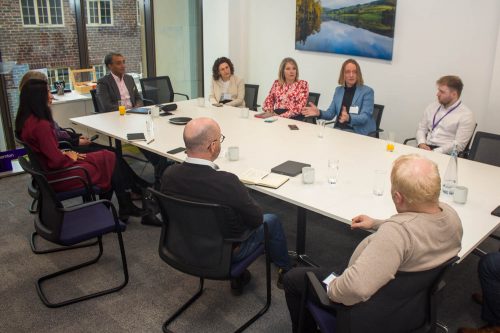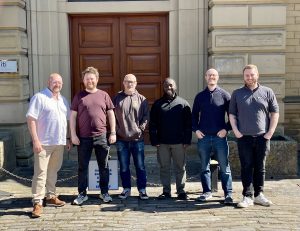How to make AI work for your business: the C-Suite view

Artificial intelligence is rapidly becoming an integral part of business processes. While generative AIs such as ChatGPT hog the public limelight, data analysis and process automation is driving deep changes in the business landscape.
AI rightly dominated the discussions among C-suite executives at TheBusinessDesk.com’s Impact of Technology round table discussion, sponsored by Grant Thornton and hosted at the firm’s Sheffield office.
Technophile Vijay Rathour, partner and head of Grant Thornton’s cyber and digital investigations team, set the scene. “I think we’re at an inflection point. Whatever the state of AI today, this is the worst it’s ever going to be.
“Some say they don’t trust it. But I trust the alarm clock to get me out of bed at 4am. We will increasingly want to use the technology to make us better, more effective, to remove the robot from the human.
“You shouldn’t fetishise humans. Humans are good, but they are not perfect. And technology is good, but not perfect.”
Firms are finding a wide range of uses for AI. Some look to automate repetitive tasks, others to gain new insights into their business data – and others have found more novel uses, such as some secretarial tasks.
Anjudeep Badachha, head of business improvement at Strata Homes, said the housebuilder was in the early days of exploring the possibilities of AI in customer relationship management. “We’re exploring our existing relationships, to understand if there are any trends in the customers we’ve acquired, and any other characteristics they may have. For example, any demographic features that we’ve overlooked or taken for granted, anything that we can’t see that might be right in front of us, but we lack the capacity and headspace to get really deep into the data.”
Matt Travis, director at environmental consultancy Enzygo, said that as well as analysing data in its project information management system, his firm used it in other time-saving applications such as taking the notes and minutes of meetings – inviting an AI agent to video conferences allowed it to product a transcript and actions.
“It’s never perfect, you’ve got to read through it. But it’s a massive thing because taking notes on a meeting is a real pain. So it’s about using those tools in business where we can become more efficient, or provide added value to clients.”
Dr Sam Chapman, chief technology officer at telemetric data management firm The Floow, said his firm uses AI in every process, and had recently started to employ AI in product testing. “We use AI systems that try to break everything we make, so we use adversarial technology to make sure things are better.
“We also use it to optimise our servers and systems. We have hundreds of servers around the world, communicating, sending data around. And if anything starts looking unusual we need to know. AI learns the trends and understands that. You can automate the process and learn things within milliseconds of things going wrong, so you can immediately and automatically fix things in real time.”
Sue Grocutt, commercial director at the University of Sheffield, highlighted another aspect of AI – whether staff would accept it. “In this context, what I have in my mind is financial processing and the tortuous, manual, slow, error-driven and depressing processing of thousands and thousands of purchase orders and invoices. That will be much easier [with AI] in a way that staff can welcome it.”
Freeing that time allowed leaders to concentrate on business improvement, added Emma Davies, partner at Grant Thornton. “I spend a lot of my time supporting finance teams where they’re going through lots of challenging change. A lot of that at the moment is data remediation, which is very time consuming.
“In future, I’m very excited because we can take some of that away that can be automated, and we can really add in value and start thinking about what else we can do, how a finance function could be improved and really support the business.
“In the future the skills of accounting will shift to be less data focussed and more value-add and supporting the business, and then thinking about growth and what’s next. That really excites me.”
Craig Finn, director at Henry Boot Construction, said that while he was very interested in the use of AI in streamlining process and improving efficiency, he was excited about how it could draw more talent into construction.
“We have an aging workforce, and that’s a big concern for me because I’ve got a lot of people poised to retire. Where’s the next generation coming from? The next generation is not really interested in construction. They think it’s all about hard hats and welly boots. Fine, that’s part of it. But a lot of my time is spent working on projects before they get into design, and making them safe, making them efficient, making them low carbon.
“More of these jobs are now done in cyberspace. Most of the tech and the talent is still emerging, and the skills to drive those technologies are yet to come into play.”
This is the first of two reports from the Impact of Technology round table. The second will look at the pros and cons of early adoption, ethical and regulatory matters, and mitigating the risks of AI.









